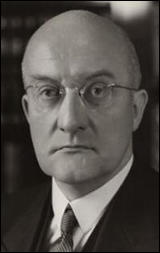Herbert von Dirksen

Herbert von Dirksen was born in Berlin, Germany, on 2nd April, 1882. After studying law he worked as a barrister and a assistant judge. In 1907 he embarked on a round-the-world tour that took him to Africa, India, China, Japan, North America, Brazil and Argentina. (1)
In 1914 von Dirksen joined the German Army and fought in the First World War where he won the Iron Cross (Second Class). After the war Dirksen joined the diplomatic service and served in Kiev (1918-19), Warsaw (1920-21), before becoming Consul-General in Danzig (1923-25). He was made head of the East European Division of the Foreign Office (1925-28) before becoming Germany's ambassador in Moscow in 1928. (2)
Adolf Hitler appointed von Dirksen as ambassador in Tokyo in 1933. Dirksen found Hitler difficult to work with. He later recalled that his first interview with Hitler lasted two or three minutes. "Hitler moved uneasily in his chair, excused himself, and left abruptly. I was confounded and furious when I left him." (3)
Dirksen became close to Richard Sorge, a German journalist, and apparently a passionate supporter of the Nazi Party. In fact, he was a Soviet agent working for the NKVD. His friendship with Dirksen enabled him to find out information about Germany's intentions towards the Soviet Union. Other spies in Sorge's network had access to senior politicians in Japan including prime minister Fumimaro Konoye and they were able to obtain secret details of Japan's foreign policy. (4)
Sorge always maintained that his job as a writer for newspapers and magazines helped him enormously in his quest for intelligence. "A shrewd spy will not spend all his time on the collection of military and political secrets and classified documents. Also, I may add, reliable information cannot be procured by effort alone; espionage work entails the accumulation of information, often fragmentary, covering a broad field, and the drawing of conclusions based thereon. This means that a spy in Japan, for example, must study Japanese history and the racial characteristics of the people and orient himself thoroughly on Japan's politics, society, economics and culture." (5)
Dirksen had a poor relationship with Joachim von Ribbentrop. In his autobiography he described him as "an unwholesome, half-comical figure". (6) On 7th April 1938 von Dirksen succeeded von Ribbentrop as Ambassador to London. In early August, Dirksen returned to Berlin to tell Hitler personally of his belief that Britain would go to war if Germany invaded Czechoslovakia, a message that the Führer ignored. In September 1938, at the Nuremberg Party Congress, Dirksen had another meeting with Hitler, where he told him of his fears of a war in Britain. (7)
After the signing of the Munich Agreement von Dirksen "gave up the idea of trying to convert von Ribbentrop to a reasonable policy". He also considered retiring: "That it was more honorable not to serve the Hitler regime altogether was a thought that lay far from me at the time." Dirksen ceased to have any influence over Hitler but he was a popular diplomat in London and was seen as "the respectable face of Nazi Germany in Britain in 1938". (8)
On the outbreak of the Second World War von Dirksen retired and returned to his country estate in Silesia. In 1947 he was investigated and although he admitted to being a member of the Nazi Party he cleared by a denazification court, "which regarded his membership of the Nazi Party as a mere formality and declined to see him as a supporter of the regime." (9)
His memoirs, Moscow, Tokyo, London was published in 1950. Although he remained critical of Adolf Hitler he stated that he was not ashamed that he had joined the Nazi Party in 1936 as the régime had achieved "impressive" political and economic changes in Germany. (10)
Herbert von Dirksen died on 19th December, 1955.
Primary Sources
(1) In March, 1939 Herbert von Dirksen, sent a telegram to Joachim von Ribbentrop, the German Foreign Minister. The telegram commented on the talks between Lord Halifax, the British Foreign Minister, and Joseph Goebbels, the German Minister of Propaganda, that had taken place in Berlin.
On his return to England he (Lord Halifax) had done his best to prevent excesses in the Press; he had had discussions with two well-known cartoonists, one of them the notorious Low, and with a number of eminent representatives of the Press, and had tried to bring influence to bear on them.
He (Lord Halifax) had been successful up to a point. It was extremely regrettable that numerous lapses were again to be noted in recent months. Lord Halifax promised to do everything possible to prevent such insults to the Fuehrer in the future.
